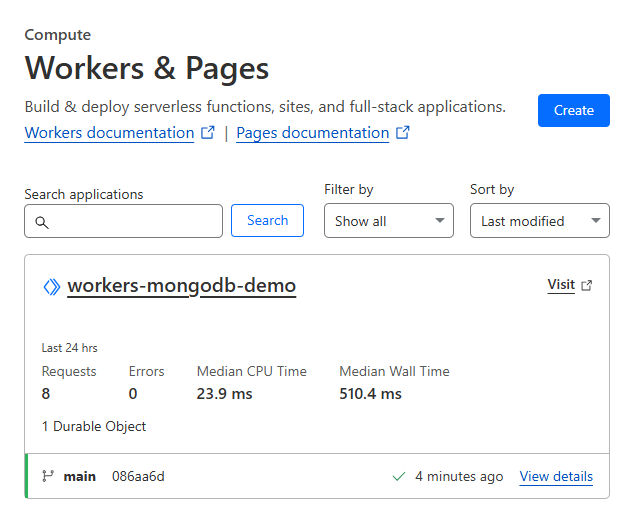Performance Profiling MongoDB on Cloudflare Workers
Cloudflare recently wrote about “Your frontend, backend, and database — now in one Cloudflare Worker”, which called out that the mongodb package should now work as expected. I validated that Cloudflare Workers and MongoDB work together as well, but how well do they work together.
Let’s evaluate this by taking MongoDB’s simple “Find a Document” tutorial and adapting it to a Workers environment.
TL;DR - MongoDB works perfectly from Cloudflare Workers, but you can significantly improve request latency by using Durable Objects
Setup
First, create a MongoDB Atlas cluster (free M0 works just fine), and load the sample datasets once the cluster is provisioned. We’ll be using the sample_mflixdataset to return some information about a movie.
Next we’ll want to setup a Cloudflare Workerto retrieve our movie information. I personally just created the Worker via the UI the using the Git integration associated my worker with an existing repo.
Default Workers Experience
Our Worker will be using the MongoDB Node.js driver to connect to the provisioned Atlas cluster using a connection string stored as an environment variable.
1
2
3
4
5
6
7
8
9
10
11
12
/**
* wrangler.jsonc
*/
{
"$schema": "node_modules/wrangler/config-schema.json",
"name": "workers-mongodb-demo",
"main": "src/index.ts",
"compatibility_date": "2025-03-21",
"compatibility_flags": [
"nodejs_compat"
]
}
1
2
3
4
5
6
7
8
9
10
11
12
13
14
15
16
17
18
19
20
21
// src/index.ts
import { MongoDBConnector } from './MongoDBConnector';
interface Env {
MONGODB_URI: string;
}
export default {
async fetch(request: Request, env: Env, ctx: ExecutionContext): Promise<Response> {
try {
let proxy = null;
proxy = new MongoDBConnector(env);
const result = await proxy.getMovie();
return Response.json(result);
} catch (error) {
console.error('Error:', error);
const message = error instanceof Error ? error.message : 'Unknown error';
return new Response(`Error: ${message}`, { status: 500 });
}
}
} satisfies ExportedHandler<Env>;
The MongoDB-specific code will handle creating the MongoClient, performing all the networking and authentication round trips and retrieving a document from the cluster.
We’ll do some basic instrumentation to capture the time between client connection and the result being returned in queryTime, which we’ll return as part of the response.
1
2
3
4
5
6
7
8
9
10
11
12
13
14
15
16
17
18
19
20
21
22
23
24
25
26
27
28
29
30
31
32
33
34
35
36
37
38
39
40
41
42
43
44
// src/MongoDBConnector.ts
import { MongoClient } from 'mongodb';
interface Env {
MONGODB_URI: string;
}
export class MongoDBConnector {
private env: Env;
private client: MongoClient;
constructor(env: Env) {
this.env = env;
this.client = new MongoClient(this.env.MONGODB_URI);
}
async getMovie() {
try {
const queryStartTime = Date.now();
await this.client.connect();
const database = this.client.db("sample_mflix");
const movies = database.collection("movies");
const query = { title: "The Room" };
const options = {
sort: { "imdb.rating": -1 },
projection: { _id: 0, title: 1, imdb: 1 },
};
const movie = await movies.findOne(query, options);
const queryTime = Date.now() - queryStartTime;
return {
movie: {
...movie
},
queryTime
};
} catch (error) {
console.error('MongoDB error:', error);
throw error;
}
}
}
Once I had my code pushed to a repo and configured my Worker to use this repo, the CI/CD process would pick up any changes automatically.
User in Toronto - Cluster in us-east-1 (N. Virginia)
My Atlas cluster is in the default region - which happens to be AWS’ us-east-1. I’m located in Toronto, so I would expect the latency between my requests and my data to be fairly low.
1
2
3
4
5
6
7
$ curl https://workers-mongodb-demo.alex-fbd.workers.dev/
{"movie":{"title":"The Room","imdb":{"rating":3.4,"votes":25750,"id":368226}},"queryTime":429}
<repeat about 5 times>
$ curl https://workers-mongodb-demo.alex-fbd.workers.dev/
{"movie":{"title":"The Room","imdb":{"rating":3.4,"votes":25750,"id":368226}},"queryTime":302}
Using the extremely scientific method of curling the workers endpoint 5-6 times and averaging the queryTime values it seems my round trip time for an operation is 300ms, with the very first request being about 100ms slower than that.
I appreciate that there are numerous round trips to required to authenticate a connection to Atlas, but MongoDB’s drivers provide connection pooling out of the box so I’d sort of expect this time to go down much more - but it doesn’t.
User in Toronto - Cluster in ap-northeast-1 (Tokyo)
Just for comparison sake since Atlas offers clusters in most AWS regions, I spun one up in ap-northeast-1 and updated the connection string in my worker to see how this might impact the round trip time of an operation.
1
2
3
4
5
6
7
$ curl https://workers-mongodb-demo.alex-fbd.workers.dev/
{"movie":{"title":"The Room","imdb":{"rating":3.5,"votes":25673,"id":368226}},"queryTime":2044}
<repeat about 5 times>
$ curl https://workers-mongodb-demo.alex-fbd.workers.dev/
{"movie":{"title":"The Room","imdb":{"rating":3.5,"votes":25673,"id":368226}},"queryTime":1901}
These requests now take almost 2 seconds each. Since Cloudflare Workers have a Smart Placement feature I wanted to try that out to see if it would have any meaningful impact.
Testing Workers and Smart Placement
After enabling the feature, Cloudflare adds a cf-placement header to all requests so you can pretty easily verify where your worker has been placed.
1
2
3
4
5
$ curl -v https://workers-mongodb-demo.alex-fbd.workers.dev/
...
< cf-placement: local-YYZ
...
{"movie":{"title":"The Room","imdb":{"rating":3.5,"votes":25673,"id":368226}},"queryTime":2029}
I ran many tests, but my response times were always the same. Initially I thought it was an issue with the Smart Placement feature, but after reviewing with a Cloudflare team member it seems Smart Placement looks at your actual traffic patterns to determine where to place it, so I’d need traffic across many regions to trigger it.
Maintaining State with Durable Objects
The nature of Workers is to provide “serverless execution environments”, so they’re likely stateless and would require connections to be re-created for each request. If we could create and reuse our MongoClient and associated connection pool, maybe our round trip times could be improved by reducing our cold-start times.
Durable Objects - which are described as being a “special kind of Cloudflare Worker which uniquely combines compute with storage” - seem like they might be suitable for our needs. The tutorial is a great resource to get us up and running quickly, which I’ve used to adapt our previous MongoDBConnector implementation:
1
2
3
4
5
6
7
8
9
10
11
12
13
14
15
16
17
18
19
20
21
22
23
24
25
26
27
28
29
30
31
32
33
34
35
36
37
38
39
40
41
42
43
44
45
46
// src/MongoDBDurableConnector.ts
import { DurableObject, DurableObjectState } from "cloudflare:workers";
import { MongoClient } from 'mongodb';
interface Env {
MONGODB_URI: string;
}
export class MongoDBDurableConnector extends DurableObject {
private env: Env;
private client: MongoClient;
constructor(state: DurableObjectState, env: Env) {
super(state, env);
this.env = env;
this.client = new MongoClient(this.env.MONGODB_URI);
}
async getMovie() {
try {
const queryStartTime = Date.now();
await this.client.connect();
const database = this.client.db("sample_mflix");
const movies = database.collection("movies");
const query = { title: "The Room" };
const options = {
sort: { "imdb.rating": -1 },
projection: { _id: 0, title: 1, imdb: 1 },
};
const movie = await movies.findOne(query, options);
const queryTime = Date.now() - queryStartTime;
return {
movie: {
...movie
},
queryTime
};
} catch (error) {
console.error('MongoDB error:', error);
throw error;
}
}
}
Let’s adapt our Worker code to be able to use either a Durable Object or the default at runtime by interpreting a query string parameter:
1
2
3
4
5
6
7
8
9
10
11
12
13
14
15
16
17
18
19
20
21
22
23
24
25
26
27
28
29
30
31
32
33
34
35
// src/index.ts
import { MongoDBConnector } from './MongoDBConnector';
import { MongoDBDurableConnector } from './MongoDBDurableConnector';
interface Env {
MONGODB_URI: string;
MY_DURABLE_OBJECT: DurableObjectNamespace<MongoDBDurableConnector>;
}
export default {
async fetch(request: Request, env: Env, ctx: ExecutionContext): Promise<Response> {
const { searchParams } = new URL(request.url)
let durable = searchParams.get('durable')
try {
let proxy = null;
if (durable === 'true') {
const id = env.MY_DURABLE_OBJECT.idFromName("mongodb-connector");
proxy = env.MY_DURABLE_OBJECT.get(id);
} else {
proxy = new MongoDBConnector(env);
}
const result = await proxy.getMovie();
return Response.json(result);
} catch (error) {
console.error('Error:', error);
const message = error instanceof Error ? error.message : 'Unknown error';
return new Response(`Error: ${message}`, { status: 500 });
}
}
} satisfies ExportedHandler<Env>;
// need to export durable object from entrypoint
export { MongoDBDurableConnector };
We’ll also need to update our wrangler configuration to ensure we’ve setup the appropriate bindings for our Durable objects:
1
2
3
4
5
6
7
8
9
10
11
12
13
14
15
16
17
18
19
20
21
22
23
24
25
26
27
28
/**
* wrangler.jsonc
*/
{
"$schema": "node_modules/wrangler/config-schema.json",
"name": "workers-mongodb-demo",
"main": "src/index.ts",
"compatibility_date": "2025-03-21",
"compatibility_flags": [
"nodejs_compat"
],
"durable_objects": {
"bindings": [
{
"name": "MY_DURABLE_OBJECT",
"class_name": "MongoDBDurableConnector"
}
],
},
"migrations": [
{
"tag": "v1",
"new_classes": [
"MongoDBDurableConnector"
]
}
]
}
Once our code is pushed and the Workers CI integration picks up the changes, we can test this out by passing durable=true to our Workers URL:
1
2
3
4
5
6
7
$ curl https://workers-mongodb-demo.alex-fbd.workers.dev/?durable=true
{"movie":{"title":"The Room","imdb":{"rating":3.5,"votes":25673,"id":368226}},"queryTime":317}
<repeat about 5 times>
$ curl https://workers-mongodb-demo.alex-fbd.workers.dev/?durable=true
{"movie":{"title":"The Room","imdb":{"rating":3.5,"votes":25673,"id":368226}},"queryTime":35}
Well that’s a heck of a lot better! Using Durable Objects we were able to get the response time down almost 10x!
I ran a number of tests and periodically you’d still get a cold-start spike, but most requests benefit from the reduced latency maintaining a stateful Worker via Durable Objects provides.
It is worth calling out that Durable Objects come with some limitations such as a soft limit of 1,000 requests per second, but for most use cases this is likely sufficient. I encourage you to try this out on your own and see how it works for you.



